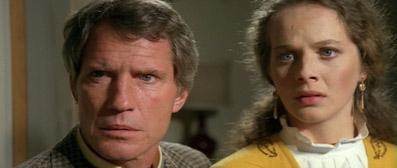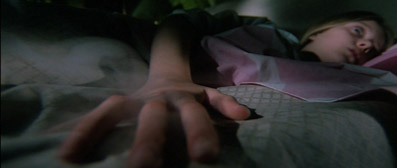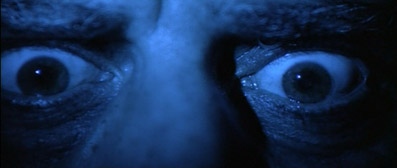|
As the title suggests, Manhattan Baby is one of Italian horror maestro Lucio Fulci's intermittent hops across the Atlantic to his second cinematic home of New York. Logical, then, that it should start in Egypt. The logic, as it happens – or at least the generic logic – does soon become evident. Ever since Karloff's definitive Im-ho-tep "went for a little walk" back in 1932, opening and entering an Egyptian tomb usually sets movie characters on the road to disaster. And Fulci not only knows his horror history, he has no qualms about recycling it.
As a horror fan, I will happily admit a fondness for old-style, Egypt set tomb-equals-doom tales, and as a kid thought that Egyptian mummies were the scariest monsters of the lot. But in 1980 it all went badly wrong for this genre devotee, as the mummy movie was clumsily reborn as a bastard offspring of the post-Omen devil movie. Opening a tomb no longer awoke the sleeping and bandaged figure left to guard its treasures, but instead triggered a seemingly random collection of supernatural incidents whose only real connection to the tomb, or even to each other, is that they were deadly and strange. Those of you of a certain age may recognise the film in question as The Awakening, which despite being co-written by Don't Look Now's Allan Scott and Chris Bryant, adapted from from Bram Stoker's Jewel of the Seven Stars, directed by Mike Newell (yes, he of Four Weddings and a Funeral, Donnie Brasco and Harry Potter and the Goblet of Fire), and starring no less than Charlton Heston and Samantha York, was preposterous nonsense. Unfortunately for me, it would appear that this very film was a partial inspiration for Fulci's wandering into similar territory.

The tomb raider here is Professor George Hacker, whose excavations uncover a stone tablet that he believes will provide a key to a tomb that none of the locals will dare enter. George clearly hasn't seen enough horror movies to realise why and thus goes in anyway, accompanied by the one site worker willing to risk his soul for archaeology. Within minutes, George has been blinded by blue lasers, though fares better than his companion, who lands on some spikes just in time to cushion George's subsequent fall. While all this is going down, George's wife Emily and daughter Susie are out seeing the sights. Emily works for Time & Life magazine and is so busy photographing the architecture that she fails to notice a creepy old blind woman hypnotising and handing an amulet to her young daughter.
On their return to Manhattan, Susie begins to have premonitions and visions, and strange things start happening around her. The babysitter and Emily's insufferable pratt of a work colleague Luke both vanish when they enter the children's bedroom, but when George and Emily investigate they find the floor covered with Egyptian sand (and before you ask, they know this because they have it analysed). A bigger problem is the time/space gateway the amulet appears to have opened, through which both Susie and younger brother Tommy go on regular spiritual jaunts. But not to worry, as help is at hand in the shape of antiques dealer Adrian Mercato, the only man who really understands what is happening and has the knowledge required to save young Susie.

If all this sounds a little jumbled then I should point out that I've simplified matters considerably just to save space. The story is certainly busy with incident but follows no clear path of logical progression. Shit just happens, and Fulci appears to have worked on the basis that throwing anythng in that might seem creepy will do the job. Borrowings from more famous horror works are easy to spot and explanations and internal logic are not so much in short supply as non-existent. Thus if the building security guard falls through the floor of a lift then that's just what evil forces do. If another blue laser pops up to restore George's robbed sight then let's be grateful for the help and not ask why. If a Polaroid that fails to develop until dropped is then picked up by an agent of the all-knowing antiques dealer, then we can assume she's been watching all along just waiting for that telling picture to be taken. While we're on the subject, since when did antiques dealers suddenly become experts in Egyptian occult and agents of self-sacrifice willing to trade their souls for that of a girl they've only just met? Mind you, it's a sorry expert who doesn't realise that there might be consequences to such an exchange, although this does give rise to one of the film's most violent but effective scenes, despite some rather obvious avian artificiality.
Manhattan Baby still has its moments, largely in Fulci's handling of individual sequences, although their sense of random generation, a lack of real character development and some iffy post-synched dialogue and sometimes inappropriate voices (the pipe smoking, chin-stroking doctor is my favourite) makes it hard to engage with on a meaningful level. The director is well served by regular editor Vincenzo Tomassi and the scope cinematography of Guglielmo Mancori, although there are enough close-ups of eyes and mouths and rapid focus pulls here to almost think of the shots that sit between them as filler. But for all that I'd still take the film's low budget energy over the stilted, studio-assembled pseudo-horror of The Awakening any day of the week, in part because Fulci's film is clearly made by people with a feel for the genre, even if its complete refusal to explain its internal logic makes it nigh-on impossible to challenge it.
A solid and largely dust-free anamorphic 2.35:1 transfer whose colour, contrast and detail are all very pleasing. Film grain is visible on areas of one colour – blue skies in the main. Black levels are generally solid.

The sound is Dolby mono 2.0 and clear of hiss and crackle. Dialogue is always clear, as it should be since most of it appears to be post-dubbed.
As ever we have the theatrical trailer (3:03), which includes many of the film's juicer moments and its most violent. The usual trailers for other Shameless releases are also included.
Interesting for the handling of individual scenes and as technically as accomplished as ever, Manhattan Baby is nonetheless some way from being my favourite Lucio Fulci film. It never tries that hard to make sense or create sympathetic characters of any depth, but there are enough quirkily effective moments to still make it of interest to the director's hardcore fans. And I've no complaints about the transfer.
|